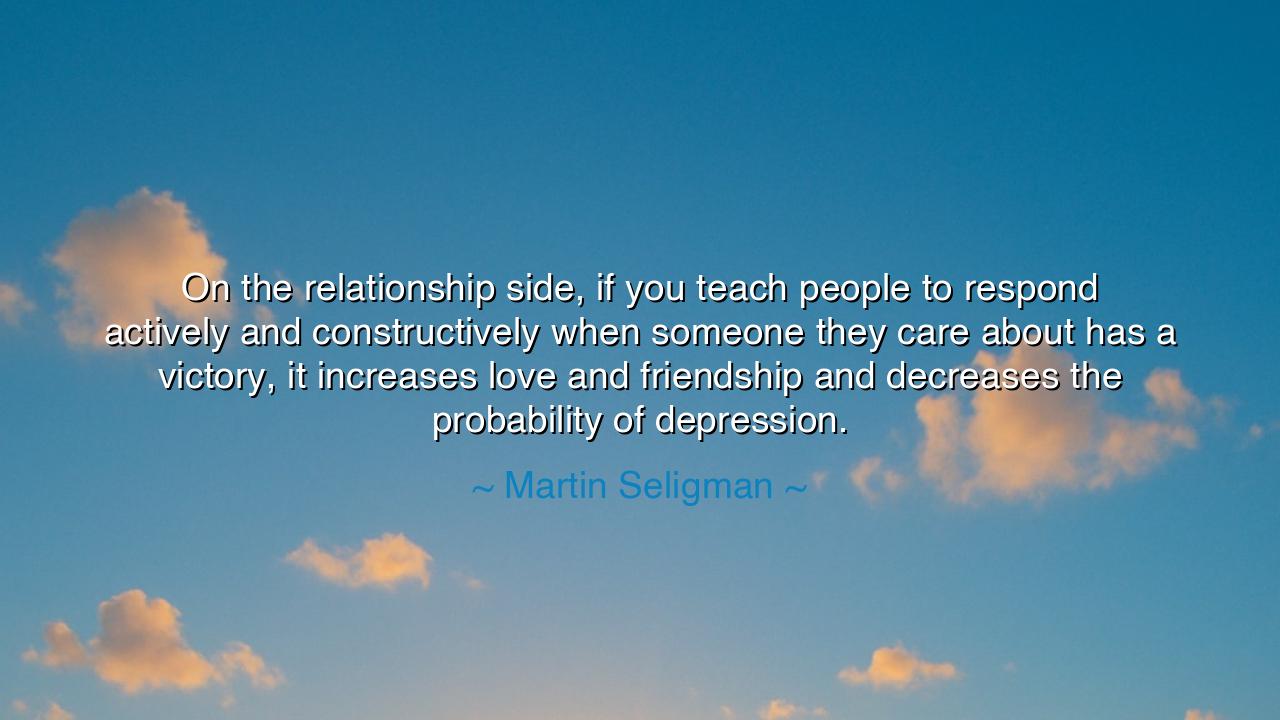
On the relationship side, if you teach people to respond actively
On the relationship side, if you teach people to respond actively and constructively when someone they care about has a victory, it increases love and friendship and decreases the probability of depression.






Listen, O seeker of the human heart, to the wisdom of Martin Seligman, the herald of positive psychology: “On the relationship side, if you teach people to respond actively and constructively when someone they care about has a victory, it increases love and friendship and decreases the probability of depression.” Here is a truth as old as the human spirit itself: the bonds that tie us to one another are nourished not only in sorrow, but even more so in moments of celebration, in the shared delight of another’s triumph. Seligman’s words illuminate a principle often overlooked: that love, friendship, and the vitality of the soul are strengthened when we cultivate a generosity of heart, rejoicing genuinely in the victories of those we hold dear.
The origin of this insight lies in Seligman’s decades of work studying the mechanics of human flourishing. He observed that relationships, the sacred web connecting one life to another, are deepened when joy is amplified communally. The act of responding actively and constructively—through encouragement, admiration, or heartfelt celebration—signals to the human spirit that it is seen, valued, and supported. In this simple but profound way, the seeds of love are sown, friendship is fortified, and the shadows of despair and depression are held at bay.
Consider the subtle power of such gestures. To celebrate another’s success is to enter into their moment of triumph with the fullness of your heart. It is not envy, nor indifference, nor the quiet murmuring of jealousy; it is a deliberate act of generosity. When one lifts another with words of encouragement, applause, or tangible support, the heart expands. This is a sacred reciprocity, for in lifting others, we are lifted ourselves, and the bonds of human connection are made resilient against the tempests of sorrow or hardship.
History offers luminous examples. Recall the friendship between Thomas Jefferson and John Adams, men whose paths were tangled with rivalry and difference, yet who chose to respond constructively to each other’s achievements later in life. Their letters brimmed with admiration for one another’s accomplishments, and through this active celebration, a profound friendship endured that enriched not only their lives but the course of a nation. This illustrates Seligman’s principle: responding to the victories of those we care about is a vessel of lasting love and mutual flourishing.
The wisdom of this practice extends even to the smallest gestures in daily life. A child brings home a triumph in learning, a friend completes a personal goal, a colleague succeeds in a shared endeavor—each moment holds the potential to strengthen bonds if met with constructive joy. Conversely, neglecting such moments, responding with indifference or envy, leaves relationships brittle, hearts isolated, and spirits vulnerable to despair. The choice is ours, as guardians of our own hearts and of the connections that define our existence.
Consider too the story of Malala Yousafzai and her allies in the struggle for education. Those who celebrated each breakthrough in her journey—through letters, recognition, and advocacy—did more than honor a single victory; they reinforced a network of support, friendship, and resilience. Each act of constructive acknowledgment was a bulwark against despair, not just for Malala but for a community seeking justice. The joy of shared victories is thus a force capable of sustaining both individuals and societies.
From these reflections arises a clear lesson: to nurture love and friendship, we must actively engage in celebrating the triumphs of others. Practical actions follow: express heartfelt congratulations without reservation, amplify the achievements of those around you, cultivate a habit of genuine delight in the successes of others, and observe the joy reflected back upon your own spirit. Such practice strengthens relationships, fortifies the human heart against despair, and weaves the sacred fabric of connection ever tighter.
Thus, as the ancients might have counseled, let us heed Seligman’s teaching: rejoice not in solitude, but in the company of those we cherish. Celebrate victories with the fullness of your being, for in these acts of constructive joy, friendship blooms, love deepens, and the shadows of depression are cast aside. In the mirror of another’s triumph, our own heart finds light, and in this light, the enduring strength of human connection is revealed.






AAdministratorAdministrator
Welcome, honored guests. Please leave a comment, we will respond soon